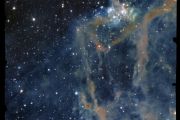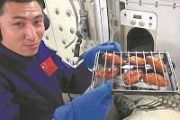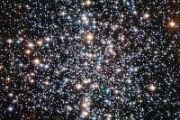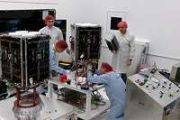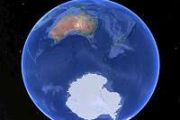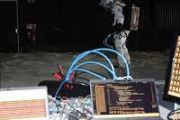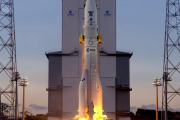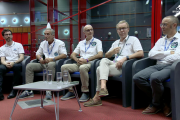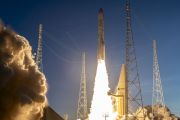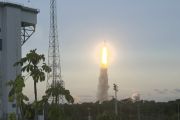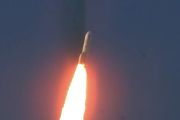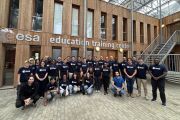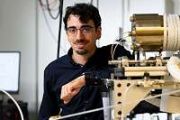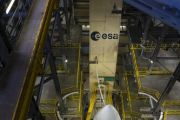
Copernical Team
Lucy completes key Earth gravity assist maneuver
 NASA's Lucy spacecraft executed a critical gravity assist maneuver on Dec. 12, 2024, skimming just 220 miles (360 kilometers) above Earth's surface. This close approach, occurring at 11:15 p.m. EST, propels the spacecraft on a new trajectory through the asteroid belt and toward the Jupiter Trojan asteroids - objects never previously visited by any spacecraft.
The maneuver marks Lucy's seco
NASA's Lucy spacecraft executed a critical gravity assist maneuver on Dec. 12, 2024, skimming just 220 miles (360 kilometers) above Earth's surface. This close approach, occurring at 11:15 p.m. EST, propels the spacecraft on a new trajectory through the asteroid belt and toward the Jupiter Trojan asteroids - objects never previously visited by any spacecraft.
The maneuver marks Lucy's seco NASA aims to solve Lunar housekeeping's biggest issue - infinite dust!
 If you thought the dust bunnies under your sofa were an issue, imagine trying to combat dust on the Moon. Dust is a significant challenge for astronauts living and working on the lunar surface. So, NASA is developing technologies that mitigate dust buildup enabling a safer, sustainable presence on the Moon.
A flight test aboard a suborbital rocket system that will simulate?lunar gravity is
If you thought the dust bunnies under your sofa were an issue, imagine trying to combat dust on the Moon. Dust is a significant challenge for astronauts living and working on the lunar surface. So, NASA is developing technologies that mitigate dust buildup enabling a safer, sustainable presence on the Moon.
A flight test aboard a suborbital rocket system that will simulate?lunar gravity is Japan's Space One delays Kairos rocket launch again
This request seems a bit unusual, so we need to confirm that you're human. Please press and hold the button until it turns completely green. Thank you for your cooperation!
Press and hold the button
If you believe this is an error, please contact our support team.
185.132.36.159 : 2bec6fa1-bbf8-461c-bced-dacf4d22
Uncrewed aircraft systems traffic management expands beyond line of sight
 NASA is advancing its Uncrewed Aircraft Systems Traffic Management Beyond Visual Line of Sight (UTM BVLOS) initiative to meet the global surge in drone usage for various applications.
Drones, or uncrewed aircraft systems (UAS), are increasingly used for services ranging from package delivery to emergency response operations such as search and rescue. Presently, these flights are largely re
NASA is advancing its Uncrewed Aircraft Systems Traffic Management Beyond Visual Line of Sight (UTM BVLOS) initiative to meet the global surge in drone usage for various applications.
Drones, or uncrewed aircraft systems (UAS), are increasingly used for services ranging from package delivery to emergency response operations such as search and rescue. Presently, these flights are largely re Black holes at the heart of Milky Way's largest star cluster reshaped in new research
 For decades, scientists have debated the source of unusual star movements in Omega Centauri, the Milky Way's largest star cluster. Recent research, incorporating new pulsar data, provides clarity, suggesting that a cluster of stellar-mass black holes, rather than a single intermediate-mass black hole (IMBH), is responsible.
Omega Centauri, home to nearly ten million stars, is located in th
For decades, scientists have debated the source of unusual star movements in Omega Centauri, the Milky Way's largest star cluster. Recent research, incorporating new pulsar data, provides clarity, suggesting that a cluster of stellar-mass black holes, rather than a single intermediate-mass black hole (IMBH), is responsible.
Omega Centauri, home to nearly ten million stars, is located in th Airbus completes delivery of Space42 Thuraya 4 satellite for December launch
 Space42's latest telecommunications satellite, Thuraya 4, designed and built by Airbus, has arrived at the Kennedy Space Center in Florida. It is set to launch into orbit aboard a SpaceX Falcon 9 rocket later this month. The satellite was transported from Toulouse, France, using an Airbus BelugaST (A300-600ST) aircraft.
Thuraya 4, a geostationary satellite, will enhance connectivity across
Space42's latest telecommunications satellite, Thuraya 4, designed and built by Airbus, has arrived at the Kennedy Space Center in Florida. It is set to launch into orbit aboard a SpaceX Falcon 9 rocket later this month. The satellite was transported from Toulouse, France, using an Airbus BelugaST (A300-600ST) aircraft.
Thuraya 4, a geostationary satellite, will enhance connectivity across Seaspan signs agreement with KVH for OneWeb LEO satellite solution
 Seaspan Corporation, a global leader in independent containership leasing, has entered an agreement with KVH Industries to equip its fleet with OneWeb's advanced low-earth orbit (LEO) satellite technology. This initiative underscores Seaspan's commitment to delivering shore-like internet capabilities at sea as part of its broader digital transformation strategy, complementing the fleet's existin
Seaspan Corporation, a global leader in independent containership leasing, has entered an agreement with KVH Industries to equip its fleet with OneWeb's advanced low-earth orbit (LEO) satellite technology. This initiative underscores Seaspan's commitment to delivering shore-like internet capabilities at sea as part of its broader digital transformation strategy, complementing the fleet's existin Discovery of a planet with a shifting gas tail
 WASP-69 b, a hot Jupiter exoplanet, is shedding its atmosphere over time, releasing hydrogen and helium particles due to intense stellar radiation. Unlike uniform atmospheric loss, these gases are shaped into a tail-like structure by the stellar wind emitted from the planet's host star.
Hot Jupiters are gas giants that orbit close to their stars, making them vulnerable to a process known a
WASP-69 b, a hot Jupiter exoplanet, is shedding its atmosphere over time, releasing hydrogen and helium particles due to intense stellar radiation. Unlike uniform atmospheric loss, these gases are shaped into a tail-like structure by the stellar wind emitted from the planet's host star.
Hot Jupiters are gas giants that orbit close to their stars, making them vulnerable to a process known a NASA plans February 2025 launch for SPHEREx mission to map the cosmos
 NASA and SpaceX have announced a targeted launch date in late February 2025 for SPHEREx, a next-generation astrophysics observatory. The Spectro-Photometer for the History of the Universe, Epoch of Reionization and Ices Explorer (SPHEREx) will launch aboard a SpaceX Falcon 9 rocket from Vandenberg Space Force Base, California.
SPHEREx, roughly the size of a compact car, will orbit Earth in
NASA and SpaceX have announced a targeted launch date in late February 2025 for SPHEREx, a next-generation astrophysics observatory. The Spectro-Photometer for the History of the Universe, Epoch of Reionization and Ices Explorer (SPHEREx) will launch aboard a SpaceX Falcon 9 rocket from Vandenberg Space Force Base, California.
SPHEREx, roughly the size of a compact car, will orbit Earth in Indian Navy and ISRO conduct astronaut well deck recovery trials for Gaganyaan Mission
 The Indian Navy and the Indian Space Research Organisation (ISRO) have advanced preparations for Gaganyaan's recovery operations by conducting "Well Deck" recovery trials on December 6, 2024. The exercise took place under the Eastern Naval Command using a well deck-equipped ship off the coast of Visakhapatnam.
A ship's well deck can be flooded to allow docking of smaller vessels, landing c
The Indian Navy and the Indian Space Research Organisation (ISRO) have advanced preparations for Gaganyaan's recovery operations by conducting "Well Deck" recovery trials on December 6, 2024. The exercise took place under the Eastern Naval Command using a well deck-equipped ship off the coast of Visakhapatnam.
A ship's well deck can be flooded to allow docking of smaller vessels, landing c 






